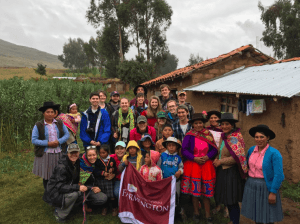By Milo Fitzgerald Contributing Writer
Preparations are underway for fourteen students to take on an intensive Peru travel course during the upcoming May term, from May 20th to June 6th. The travel course is led by Professors of Anthropolo
gy Nicole and Lucas Kellett, who started the travel course in 2013 and have offered it every two years since then.
According to Nicole Kellett, “Students will see a huge variety of landscapes,” ranging from the urban city and dry coast of Lima, to the rural highlands of Andahuaylas, to the rich (and treacherous) biodiversity of the Amazon Rainforest, as well as Ayacu
cho, Cusco, and Aguas Calientes. The students will also visit el Museo de la Memoria in Ayacucho, a historic site created by – and dedicated to – the victims of the civil war that began in 1980.
This year’s itinerary has been revamped to offer students more time in the areas that have been popular with previous travel course participants. This year’s travellers will therefore be spending an additional night in the Amazon Rainforest, meaning they will be in the jungle for three full days and four nights.
Many students who sign up for a non-European travel course will experience some culture shock after witnessing the vastly different types of food and living conditions present in these countries, including limited accessibility to clean water. Kellett suspects that experiences like these “put things in stark relief” for students, which is why they often return to the United States with a new sense of prioritization.
The students will be taking a crash-course in Spanish during May term prior to departure to alleviate some of the language barrier, but they are hoping to pick up more of the language during the trip.
“There is no better way to learn a language than to go to a country that speaks it,” said Ze’ev Shames, a sophomore Anthropology major who is going on the trip. The group believes that traveling helps break down ethnocentric views of the world.
While Shames is most looking forward to learning about Peruvian history and current politics, Nolan Crandall, currently an undeclared sophomore, is most excited about spending time in the rural communities of Andahuaylas with his fellow students. “Every time I travel, I get something unique from that experience. Every time I go to a different country and meet different people, my perspective on the world widens,” said Crandall.
Students also enjoy socializing with local children throughout the trip. “Soccer is like a universal language,” Kellett said
While the Kellett’s will return to Peru with a group of students for the fourth time this spring, the couple has travelled to the South American country far more often than that. The two professors have done extensive anthropological and archaeological research in Peru. “It’s like a second home for us,” said Kellett.
Above all, Kellett’s favorite part of the travel course is “seeing Peru through the students’ eyes,” while also witnessing the beginning of “enduring friendships” that students make with each other along the way.
Grace Hansen, a junior Anthropology major with a Spanish minor, participated in the Peru travel course as a freshman in 2017. She believes that the close connections she made with her classmates on the trip was a unique and unreplicable experience. Hansen advises the future travelers to do their coursework, but to also “be open-minded” and enjoy the non-academic experiences of the trip, too.
